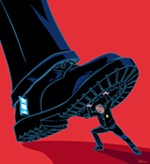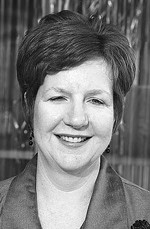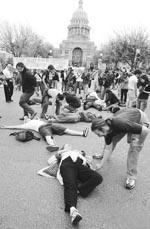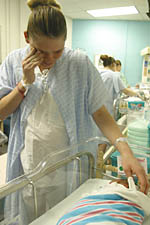After 18 Months, APD Releases Report on King Shooting
The APD report on the Sophia King shooting answers some questions, leaves others unaddressed
By Lucius Lomax, Fri., Feb. 20, 2004

"All I saw was the knife."
That is the final epitaph for Sophia King, a 22-year-old mother of two with a history of mental illness who was shot and killed by police at the Rosewood Courts housing project in June of 2002. King, described by police as an "EDP" – emotionally disturbed person – with a history of violence, was threatening the housing project's manager with a kitchen knife when shot by veteran APD Officer John Coffey.
"She did not say anything to the manager. She started going faster towards the manager, and I drew my weapon. The manager started backing up and fell to the ground landing on her butt," Coffey said in a statement to homicide investigators at the time, describing the chain of events that led to the King killing. "I then saw the blade moving forward and coming down. The manager said no, no, no. And I said drop the knife again and then I fired my weapon. I believe that I shot her in the left shoulder."
Actually the bullet struck King below her left shoulder, pierced her left lung, heart, and right lung. She sat up briefly, attempted to say something, and then lay back on the grass and died. The statements of the officers involved were released by police last week, more than 18 months after the fact. The public, normally barred by police from knowing the intricate details of officer-involved "incidents," is being granted a closer look at the King case because the police administration and city manager hope to fade the heat as APD faces increasing complaints that officers on patrol on the Eastside shoot first and read the manual afterward.
King, who was black, was facing eviction at the time and had apparently focused her anger on Rosewood Courts manager Diana Powell. King had a history of schizophrenia and had previously been a patient at the State Hospital, and the report says she had expressed a wish to die to officers in the moments before she was shot. (Powell is white, as is Officer Coffey. Of 14 fatal police shootings since 1990, seven have featured a white officer and a black or Hispanic suspect.)
Although the police administration released literally hundreds of pages, as well as a video of the scene and the 911 calls made to police that day, fundamental issues of the King case remain unresolved. At the time of the shooting, Assistant Chief Rick Coy promised to make public the department's plan for strengthening its mental health response, which is the biggest growth area in modern criminology. That has yet to be done. In addition, there were complaints that King was disrespected in death, as detectives and technicians allowed her at-times uncovered body to lay on the open grass during an hours-long period, with nearby residents calling out requests that she be covered.
Detectives and technicians also allegedly made crude comments ("I took her temperature, and we are done") at the crime scene in earshot of the public. The department has not responded to either complaint.
There are also open issues of training and equipment reflected in the King incident. "I holstered my weapon and kneeled down beside her," Officer Coffey told detectives. "I told her to take it easy and keep breathing."
Telling someone who has been shot in the chest with a .40-caliber bullet to "keep breathing" may not be a particularly helpful intervention. There was no police "trauma kit" in any of three police vehicles at the scene, and an arriving detective, Benjamin Martinka, took a plastic grocery bag from a nearby apartment and used it as a glove to apply pressure to King's wound.
City police are required to certify in CPR at the academy, but not to recertify, according to officers, and many forget or are reluctant to attempt life-saving measures. King only lived 10 to 15 seconds, according to the medical examiner, and resuscitation probably would not have been helpful, but technically the police are first-responders and, as in this case, are sometimes present when the "injury" is first incurred. Officer Coffey apparently made no effort to perform CPR until Martinka's intervention.
Coffey's actions at Rosewood Courts that day have, however, been described by police officialdom as not only justifiable but in some sense exemplary. Coffey is a former instructor at the police academy who had previously been credited in evaluations as having a good understanding of the use of force but criticized by superiors as lacking the ability to improvise in a crisis. (In the King case, Coffey told investigators that he had intended to grab King but she ran right past him without paying any attention to his presence.)
Even before the investigation of King's death was complete, Officer Coffey was invited back to the academy to lecture police cadets on "what it is like" to be in a police shooting. Officer Coffey was promoted to corporal last October. In what appears to be a nod to Eastside sensibilities, however, his new role as a supervisor will keep him west of Interstate 35.
Got something to say on the subject? Send a letter to the editor.










